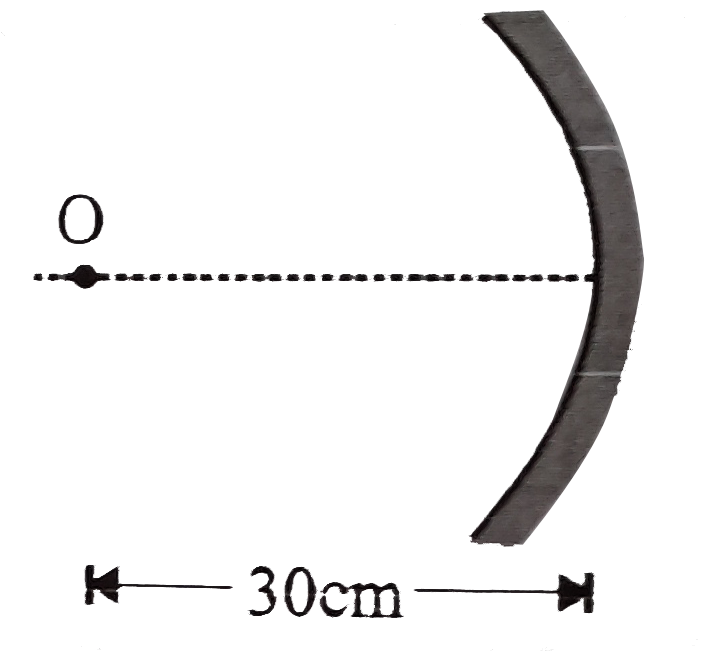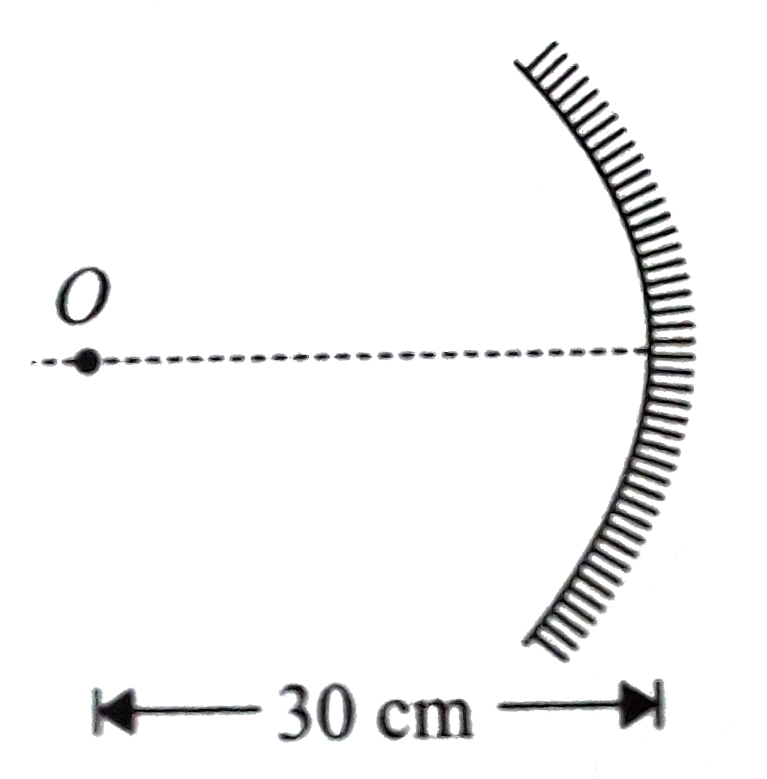When an object is placed normally on the principal axis of a spherial mirror at a distance 'a' from its pole, its image is formed at a distance 'v' from the pole of mirror such that 1v+1u=1f, where f = focal length of given mirror.
The relation is called mirror formula and is true for all types of mirrors under all conditions. However, values of u, v and f must be put with proper signs are per the sign convention followed. If 'h' be the height of the linear object and h' the height of image, then ratio h'h is called linear magnification or lateral magnification and its value m is given as :
m=h'h=−vu
(d) Define longitudinal magnification.
Longitudinal magnification is defined as the ratio of length of image to the length of an object held along the principal axis of the mirror.
Topper's Solved these Questions
- RAY OPTICS AND OPTICAL INSTRUMENTSBook:U-LIKE SERIESChapter:RAY OPTICS AND OPTICAL INSTRUMENTSExercise:MULTIPLE CHOICE QUESTIONS
Explore 39 Videos
- RAY OPTICS AND OPTICAL INSTRUMENTSBook:U-LIKE SERIESChapter:RAY OPTICS AND OPTICAL INSTRUMENTSExercise:FILL IN THE BLANKS
Explore 20 Videos
- RAY OPTICS AND OPTICAL INSTRUMENTSBook:U-LIKE SERIESChapter:RAY OPTICS AND OPTICAL INSTRUMENTSExercise:SELF ASSESSMENT TEST (SECTION B)
Explore 3 Videos
- NUCLEIBook:U-LIKE SERIESChapter:NUCLEIExercise:Self Assessment Test
Explore 10 Videos
- SEMICONDUCTOR ELECTRONICS : MATERIALS, DEVICES AND SIMPLE CIRCUITSBook:U-LIKE SERIESChapter:SEMICONDUCTOR ELECTRONICS : MATERIALS, DEVICES AND SIMPLE CIRCUITSExercise:SECTION B
Explore 1 Video
Similar Questions
When an object is placed normally on the principal axis of a spherial mirror at a distance 'a' from its pole, its image is formed at a distance 'v' from the pole of mirror such that 1v+1u=1f, where f = focal length of given mirror.
The relation is called mirror formula and is true for all types of mirrors under all conditions. However, values of u, v and f must be put with proper signs are per the sign convention followed. If 'h' be the height of the linear object and h' the height of image, then ratio h'h is called linear magnification or lateral magnification and its value m is given as :
m=h'h=−vu
(e) Find an expression for longitudinal magnification of a small object placed linearly along the axis of a spherical mirror.
View SolutionWhen an object is placed normally on the principal axis of a spherial mirror at a distance 'a' from its pole, its image is formed at a distance 'v' from the pole of mirror such that 1v+1u=1f, where f = focal length of given mirror.
The relation is called mirror formula and is true for all types of mirrors under all conditions. However, values of u, v and f must be put with proper signs are per the sign convention followed. If 'h' be the height of the linear object and h' the height of image, then ratio h'h is called linear magnification or lateral magnification and its value m is given as :
m=h'h=−vu
(a) A planer object of length 3 cm and breadth 2 cm is held normal to the principal axis of a concave mirror of focal length 20 cm at a distance of 30 cm from its pole. Where is its image formed?
View Solution
Knowledge Check
An object is placed on the principal axis of a concave mirror at a distance of 1.5 f(f is the focal length). The image will be at,
A1.5fB−1.5fC3fD−3fAn object is present on the principal axis of a concave mirror at a distance 30cmfrom it.Focal length of mirror is20cm

Image formed by mirror isAAt a distance 60cmin front of mirror.BAt a distance 60cmbehind of mirror.CAt a distance 12cmin front of mirror.DAt a distance 12cmbehind of mirror.An object is present on the principal axis of a concave mirror at a distance 30cm from it. Focal length of mirror is 20cm.

Q. Image formed by mirror isAAt a distance of 60cm in front of mirrorBAt a distance 60cm behind the mirrorCAt a distance 12 cm in front of mirrorDAt a distance 12cm behind the mirror
When an object is placed normally on the principal axis of a spherial mirror at a distance 'a' from its pole, its image is formed at a distance 'v' from the pole of mirror such that 1v+1u=1f, where f = focal length of given mirror.
The relation is called mirror formula and is true for all types of mirrors under all conditions. However, values of u, v and f must be put with proper signs are per the sign convention followed. If 'h' be the height of the linear object and h' the height of image, then ratio h'h is called linear magnification or lateral magnification and its value m is given as :
m=h'h=−vu
A small match box lies along the principal axis of a concave mirror and one end of match box is at centre of curvature of the mirror. Draw a ray diagram to show its image. Is its magnetification uniform?
View SolutionWhen an object is placed normally on the principal axis of a spherial mirror at a distance 'a' from its pole, its image is formed at a distance 'v' from the pole of mirror such that 1v+1u=1f, where f = focal length of given mirror.
The relation is called mirror formula and is true for all types of mirrors under all conditions. However, values of u, v and f must be put with proper signs are per the sign convention followed. If 'h' be the height of the linear object and h' the height of image, then ratio h'h is called linear magnification or lateral magnification and its value m is given as :
m=h'h=−vu
What is the surface area of image of linear object formed by the given concave mirror?
View SolutionAn object is present on the principal axis of a concave mirror at a distance 30cm from it. Focal length of mirror is 20cm.

Q. Image formed by mirror is
View SolutionWhat is f in mirror formula 1u+1v=1f ?
View SolutionAn object is kept on the principal axis of a concave mirror of focal length 10cm, at a distance of 15 cm from its pole. The image formed by the mirror is:
View Solution
